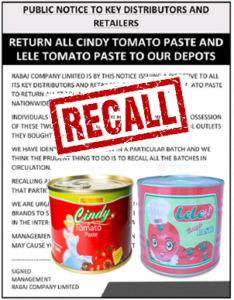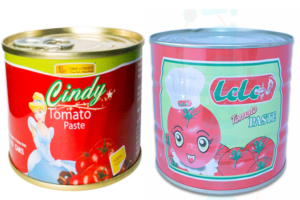In Ghana the procedures for food recall are not well established: the case of Cindy & Lele tomato paste recall
By Emmanuel Damoah
 RABAJ COMPANY LIMITED a tinned tomato manufacturer sent a public notice issuing a directive to all its key distributors and retailers of CINDY AND LELE TOMATO PASTE to return the product because management identified “an anomaly in a particular batch.”
RABAJ COMPANY LIMITED a tinned tomato manufacturer sent a public notice issuing a directive to all its key distributors and retailers of CINDY AND LELE TOMATO PASTE to return the product because management identified “an anomaly in a particular batch.”
On 29th November 2019, the Company, in an announcement published in the Daily Graphic, page 43, recalling two brands (Cindy and Lele Tomato Paste) from the supply chain. According to management, they have realized some ‘anomaly in a particular batch and think the prudent thing to do is to recall all the batches in circulation.”
This procedure is called product recall, which is facilitated by traceability. The recalling of all batches of the brands will enable to clear the particular defective batch from the market.
A product recall is an indication that traceability policy in an organization is functioning and effective. It simply means the ability of a food business operator to track or trace food products from the market/supply chain or even in the course of production in the unlikely event of a food safety non-conformance or deviation.
The first priority of traceability is to protect or ensure consumer safety through faster and detailed identification of the product under review.
Food recalls are practically effective when a food business operator has a functioning traceability system or procedure for its entire supply chain. It requires the knowledge of the batch, raw materials/ingredients, product formulation, amongst others, as key elements that should be reviewed in traceability or recall.
Batch numbers or codes are normally used for traceability purposes. So, where no other traceability system is in place, batch numbers or codes can be used. The batch number or code should be recorded together with the date of manufacture and other relevant production or manufacturing details to facilitate traceability.

RABAJ COMPANY LIMITED sent a public notice issuing a directive to all its key distributors and retailers of CINDY AND LELE TOMATO PASTE to return all stock in their possession to their depots nationwide as well as retail outlets for individuals who may have purchased them. Sincerely, I want to commend the management of RABAJ COMPANY LIMITED for not compromising on consumer and food safety regardless of the loss to operations.
The Public Health Act, 2012 in Ghana, provides for the FDA to protect public health. It behooves on the FDA to take steps appropriate to remove any threat to public health including ordering food and product recalls. As a Good Manufacturing Practices (GMP) requirement, traceability must be demonstrated both upstream and downstream.
My humble appeal goes to the Ghana FDA, as a matter of urgency should come up with the necessary guidelines on product recall in Ghana, and if possible, review it to meet legislative requirements.
Consumers deserve nothing but quality and wholesome foods always. What do you think? Let’s share our knowledge.
Consumers must be vigilant when buying products, especially, promotion items. Manufacturing, Expiry, Batch, and state of the product are necessary checks that should not be compromised.
Food recalls are initiated when the risk of consuming the affected food or product is established. This risk is assessed based on the worst-case scenario. Practically, the factors or situations that warrants product being withdrawn from the market include failure of heat treatment, microbiological contamination and an allergen that is not indicated in the labeling. High levels of contaminants, violations of regulations concerning additives, errors in the dosage of added nutrients and serious errors in composition are also reasons that may make the withdrawal of the product necessary.
To prevent consumers from being exposed to any risks, the company or manufacturer must immediately issue a press release regarding the recall. The press release and the public announcement shall pinpoint the affected product evidently and explain why the withdrawal procedure is necessary, stating what the flaw is and probable complications if the product is consumed.
All similar affected products in-stock will be segregated, quarantined and treated as potentially unsafe products. If the affected batch returns to the warehouse or retailers, they are quarantined and disposed per procedure.

One response to “In Ghana the procedures for food recall are not well established: the case of Cindy & Lele tomato paste recall”
This is a wake-up call to the FDA , a little diligence is all we ask as consumers. Credit to you (writer) for the awareness and calling them out. Cheers 🙂